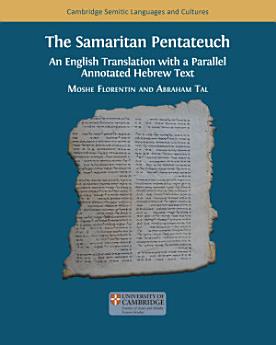The Samaritan Pentateuch: An English Translation with a Parallel Annotated Hebrew Text
About this ebook
The translation is based on a grammatical analysis of each and every word in the text according to its oral pronunciation, informed by examination of the Samaritan translations into Aramaic and Arabic as well as other Samaritan and non-Samaritan sources.
One of the most ancient and important Samaritan manuscripts of the Pentateuch, MS Nablus 6, copied in 1204 CE, serves to represent the Samaritan version.
The English translation is placed in the left-hand column of each page, while the Samaritan original is displayed in the right-hand column. For the reader’s convenience, differences between the Samaritan and Masoretic versions are marked in red.
In addition to translating the Hebrew text and highlighting the differences between it and the Masoretic text, each difference is explained in a brief note in an apparatus at the bottom of the page. Where expansion is appropriate, the reader is referred to extended notes at the end of the edition.
Ratings and reviews
- Flag inappropriate
- Flag inappropriate
- Show review history
About the author
Moshe Florentin is Professor Emeritus in the Department of Hebrew Language and Semitic Linguistics at Tel Aviv University, and a member of the Academy of the Hebrew Language. His previous books dealing with the study of the Samaritans are The Tulida (Yad Yizhak Ben-Zvi, 1999), Late Samaritan Hebrew (Brill, 2005), The Pentateuch – The Samaritan Version (with Moshe Florentin, 2010, TAU University Press), and Samaritan Elegies (The Bilik Institution, 2012).
Abraham Tal is Professor Emeritus at the Department of Hebrew and Semitic Linguistics of TAU, formerly the vice-president of the Academy of Hebrew Language and editor-in-chief of the Historical Dictionary of the Hebrew Language. Among his major publications: Among his major publications are A Dictionary of Samaritan Aramaic (2000, Brill), The Pentateuch – The Samaritan Version (with Moshe Florentin, 2010, TAU University Press), Tibat Marqe – Edition, Translation, Commentary (Studia Samaritana, 2019, de Gruyter), and Samaritan Aramaic (2013, Ugarit Verlag).





